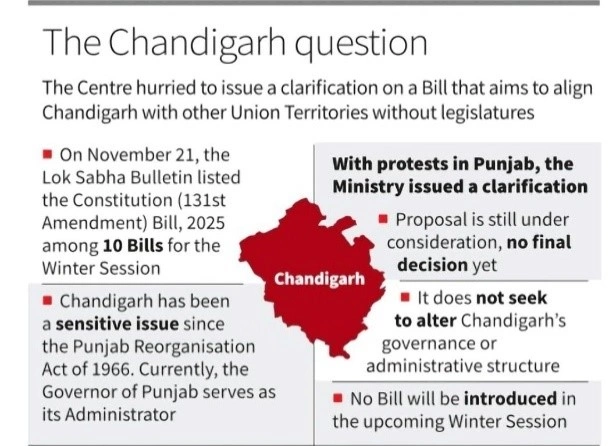Paper: GS – II, Subject: Polity, Topic: Legislature, Issue: Constitution (131st Amendment) Bill, 2025.
Context:
The proposed Constitution (131st Amendment) Bill, 2025 aiming to clarify Chandigarh’s administrative status and align it with provisions applicable to Union Territories without legislatures has triggered political debate in Punjab and across UT governance circles.
Key Takeaways:
- The centre has clarified that it has no plan to introduce the Constitution Amendment Bill regarding Chandigarh in the upcoming Winter Session of Parliament
- The move is seen as having implications for federal relations, state claims over Chandigarh, and the broader balance of administrative powers between the Centre and the states.

Objective of the Amendment:
- The Bill seeks to include Chandigarh under Article 240 of the Constitution.
- Empowers the President to issue regulations for specified Union Territories that do not have their own legislative assemblies.
- By bringing Chandigarh under this provision, the Union Territory would be treated similarly to Lakshadweep, Dadra and Nagar Haveli and Daman and Diu, Puducherry in special circumstances, and the Andaman and Nicobar Islands.
Chandigarh:
- Chandigarh, known as the “City Beautiful,” is a well-planned city nestled in the Shivalik foothills.
- Designed by French Architect Le Corbusier, it represents modern architecture and urban planning.
- Declared a Union Territory on 1st November 1966, it serves as the joint capital of Punjab and Haryana, bordered by both states.
Power of President to make Regulations Territories (Article 240):
- Clause (1) of Article 240 empowers the President to make regulation for the peace progress and good government of the Union Territory of the Andaman & Nicobar Islands, Lakshadweep, Dadra and Nagar Havel However, if a Legislature for the Union Territory of Pondicherry Daman & Diu, and Pondicherry.
- Clause (2) of Article 240 provides that regulations made by the President for that Territory,” shall have the same force and effect as an Act of Parliament.
- The regulations may repeal or amend any law made by Parliament under its powers conferred by Articles 245 and 246.
Difference in Status of state and UT:
| State | UT |
| It is an independent unit which is run by the state legislature which either is unicameral or bicameral. | It is not an independent unit but is run by the administrators appointed by the President of India |
| Centre’s relationship is Federal | Centre’s relationship is Unitary. |
| The Governor is the constitutional head of the state. | The President is the executive head of the union territory |
| States have their own set of powers | Union territories are not self-governing |
La Excellence IAS Academy, the best IAS coaching in Hyderabad, known for delivering quality content and conceptual clarity for UPSC 2025 preparation.
FOLLOW US ON:
◉ YouTube : https://www.youtube.com/@CivilsPrepTeam
◉ Facebook: https://www.facebook.com/LaExcellenceIAS
◉ Instagram: https://www.instagram.com/laexcellenceiasacademy/
GET IN TOUCH:
Contact us at info@laex.in, https://laex.in/contact-us/
or Call us @ +91 9052 29 2929, +91 9052 99 2929, +91 9154 24 2140
OUR BRANCHES:
Head Office: H No: 1-10-225A, Beside AEVA Fertility Center, Ashok Nagar Extension, VV Giri Nagar, Ashok Nagar, Hyderabad, 500020
Madhapur: Flat no: 301, survey no 58-60, Guttala begumpet Madhapur metro pillar: 1524, Rangareddy Hyderabad, Telangana 500081
Bangalore: Plot No: 99, 2nd floor, 80 Feet Road, Beside Poorvika Mobiles, Chandra Layout, Attiguppe, Near Vijaya Nagara, Bengaluru, 560040
